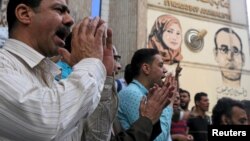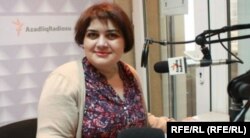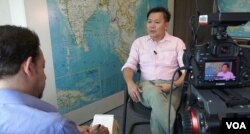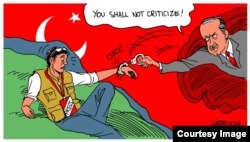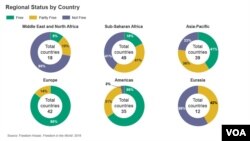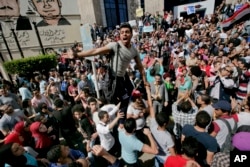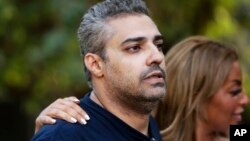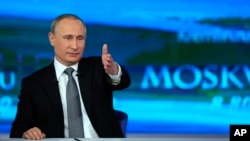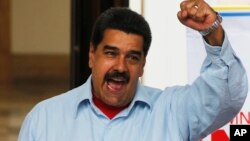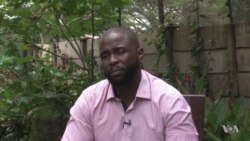When journalists and media rights activists gather in Helsinki to mark World Press Freedom day Tuesday, there will be a notable absence: Journalist Khadija Ismayilova, recipient of this year’s UNESCO/Guillermo Cano World Press Freedom Prize, is currently serving a 7.5-year sentence in Azerbaijan for her work exposing government corruption.
The Committee to Protect Journalists (CPJ) says some 200 journalists like Khadija are currently jailed across the world. And prison isn’t the only way that governments co-opt or suppress the media.
Thai journalist Pravit Rojanaphruk was also invited to Helsinki, but the ruling military junta has banned him from leaving the country – a small price to be paid, he recently wrote, “as journalists elsewhere face long-term detention or even assassination.
“Most Thai journalists play it a little safe by ensuring that at least they adopt an adequate level of self-censorship when it comes to discussing or criticizing the military regime,” he told VOA. “You know when you've crossed the line [when] you get detained without charge by the military regime.”
Global press freedom has fallen to its lowest point in more than a decade, notes Freedom House in its latest annual report, which scores 199 countries and territories, democracies and autocracies.
“Only 13 percent of the world’s population enjoys a free press—that is, where coverage of political news is robust, the safety of journalists is guaranteed, state intrusion in media affairs is minimal, and the press is not subject to onerous legal or economic pressures,” the report finds.
In a video statement marking World Press Freedom Day, John Lansing, CEO of the U.S. Broadcasting Board of Governors (BBG), said "Freedom of the press is a basic tenet of our democracy and a staple of a free and open society."
'Witch-hunt' in Turkey
Turkey witnessed a drop in press freedom over the past year as a result of a media crackdown one prominent editor called a “witch-hunt.” Reporters without Borders (RSF) ranks Turkey 151 out of 180 countries in its World Press Freedom Index, down two points since 2015.
As many as 2,000 individuals – reporters, celebrities, academics and students – are reportedly being officially investigated on charges of insulting President Recep Tayyip Erdogan or spreading “terrorist propaganda.”
Foreign journalists have come under increasing scrutiny. Der Spiegel’s correspondent was forced to leave Turkey, after the government failed to renew his press credentials. In April, Turkish police denied entry to a reporter for German State TV. Similarly, when American journalist David Lepeska returned to Ankara after a vacation in Italy, he was blocked from re-entering Turkey.
“I was told to wait in the immigration waiting area for a final decision from Ankara regarding my entry to Turkey,” Lepeska told VOA via a direct message on Twitter. “After nearly 20 hours that decision still hadn't come so, on the advice of my employers and an adviser, I decided to fly out of the country. I'm still awaiting final word from Ankara, on whether my entry ban is official and the reason for it. I can only guess that it had something to do with my reporting.”
Lepeska says he had never faced any restrictions or pressure at any time during three years’ reporting in Turkey. Nor did he ever receive any warning.
Arrests, threats on the rise in Egypt
Journalists across Eastern and Southern Africa faced rising political pressure last year, according to Freedom House. Although the 2010 Constitution in Kenya prohibits government interference in media, reports of intimidation and harassment are increasing in number. A media council set up by the government in 2013 has the power to impose stiff fines on reporters or withdraw press accreditation.
“Oh yes, we've faced a number of threats over the years,” said John Allan-Namu, an investigative journalist who left Kenya TV in late 2015 to co-found the Africa Uncensored news site. “We've faced threats from the police, from various quarters within the government -- fairly high in the rank of government.”
Allan-Namu says journalists have also been threatened by private businessmen and entrepreneurs – “basically anyone who feels aggrieved by our stories.”
Egyptian media has experienced an acute decline in freedom under President Abdel Fattah el-Sissi, who has personally met with journalists and writers at least three times since coming to power in a clear effort to set government red lines.
Last year, Egypt imprisoned a record 23 journalists, according to the CPJ, second only to China as the worst global jailer of journalists. Security forces arrested dozens of journalists attempting to cover recent protests against the transfer of two Red Sea islands to Saudi Arabia and, on Sunday, stormed the press syndicate’s Cairo headquarters, arresting two journalists who had been participating in a sit-in to express solidarity with their jailed colleagues.
The state-controlled news agency MENA reported that arrest warrants had earlier been issued against the two journalists, who are accused of posting false news on Facebook to incite the April 25 protests.
“President Abdel Fattah el-Sissi he mainly sees the media’s role is to support the regime and act like a propaganda machine for the regime,” said Khaled Dawoud, assistant Editor-in-Chief of Al-Ahram weekly and spokesman for the liberal al-Dostour party. “And we refuse to play this role. Our rule is provide objective and credible coverage of events that are taking place in Egypt.”
Egypt is now turning its attention to social media. This month, the speaker of Egypt’s parliament called for new laws that would allow authorities to prosecute Facebook users posting material “dangerous to…national security.”
In September 2015, Sissi told CNN that Egyptians enjoy unprecedented freedom of expression.
“And throughout the time I have been in office, nothing will happen to the people of the press or the people of the media,” he said.
Mohamed Adel Fahmy, former Cairo bureau chief for Al Jazeera, spent more than 400 days locked up in Egypt's notorious Tora prison.
"The only positive development in Egypt's deteriorating environment of press freedom is that pro-government journalists and some die-hard celebrity TV anchors supportive of the government are now relentlessly criticizing the unprecedented crackdown," he said, calling on Egypt to release photojournalists Mahmoud Abu Zeid and author/journalist Ahmed Naji, "serving time for crimes they did not commit."
Taking on cyberspace in China
The internet is posing challenges for other authoritarian governments seeking to curb free speech. Last year, for example, China passed a national security law and drafted a cyber security law which open the door for widespread crackdowns on free speech online.
“Probably the biggest setback in terms of freedom of the press in the past three years has been the increased control over the internet in China. China has always controlled the internet in China,” said William Nee, a China researcher at Amnesty International. “It set up the great firewall, probably the greatest censorship apparatus there is to control the internet.”
At the opening of a major internet conference in Beijing in December 2015, President Xi Jinping advocated respecting the rights of internet users “to exchange ideas and express their minds;” this, as prominent rights lawyer Pu Zhiqiang was facing charges of “inciting ethnic hatred” and “picking quarrels and provoking trouble” for a series of messages he posted on the popular microblogging site Weibo.
“When Xi Jinping rose to power in 2013, he went after the big celebrities, the big Vs – verified users, the big Vs – verified users in Weibo and people who had millions of followers,” said Nee. “Weibo, despite the censorship, was a relatively vibrant place where people could talk about public affairs, talk about news.”
But the crackdown has not only tamed this vibrant media space, said Nee, but had a carry-over, sobering impact on traditional media outlets.
Similar campaigns are underway in Russia, where independent media are facing growing pressure under Vladimir Putin, especially during the current economic crisis.
“Before 2011 they basically ignored what was going on the internet, on social media,” said Ilya Klishin, digital media chief at the independent Dozhd TV, also known as TV Rain. “They thought if you control the…major TV stations, then you’re good. Then you control the public opinion.”
But the power of the internet became clear after 2011-2012 street protests, largely organized on social media, and Klishin says efforts to control its influence have gained added urgency ahead of parliamentary elections slated for September.
“A witch-hunt is being waged against independent media, which are increasingly branded as a ‘fifth column’ seeking to destabilize the country,’” was the way Reporters Without Borders described the current media climate in its April on press freedom.
Refusing to sell newsprint in Venezuela
In the Americas, press freedoms tend to be higher, with some notable exceptions.
In an effort to silence its media critics, the government of Venezuela has gone so far as to refuse to sell newsprint, forcing dozens of newspapers to suspend printing or shut down altogether.
As a result, many journalists have turned to the internet – among them, Alberto Federico Ravell, former CEO and co-founder of the news channel, Globovisión. After leaving the network in 2010 – allegedly under government pressure – he co-founded the web news portal La Patilla. Highly critical of the government of President Nicolas Maduro, La Patilla ranks among the top most visited sites in Venezuela.
"They see us as the media of the CIA or the State Department,” Ravell. “This government really maintains a relentless persecution against the media and against the directors and editors of newspapers.”
The U.S. scores high among the major media watchdog organizations, but watchdog groups note some concerns:
Freedom House notes that U.S. media have been caught up in the 2016 presidential election campaign. “The leading Republican candidate, Donald Trump, made criticism of individual journalists and outlets a major focus of his appeal and used outrageous social-media comments to attract and divert traditional media coverage,” Freedom House said in its annual report.
RSF ranks the U.S. 41st out of 180 in its most recent index, citing what it called a “war on whistleblowers” in the U.S. and expressed concern over the arrests of journalists during #Blacklivesmatter protests in Baltimore and Minneapolis.
The CPJ has for its part expressed concern over the Pentagon’s first Law of War Manual, which notes that some journalists in conflict may be “unprivileged belligerents,” using journalism as a cover for other activity. This, it says, could open the door for U.S. military to detain journalists without charge, evidence or trial.
Contributors to this report include Steve Herman from Bangkok, Amos Wangwa from Nairobi;, Bill Ide from Beijing, Daniel Schearf from Moscow, Pros Laput in Hong Kong, Hamada Elrasam from Cairo and Jose Pernalete from Miami.
WATCH: International journalists discuss press freedom




